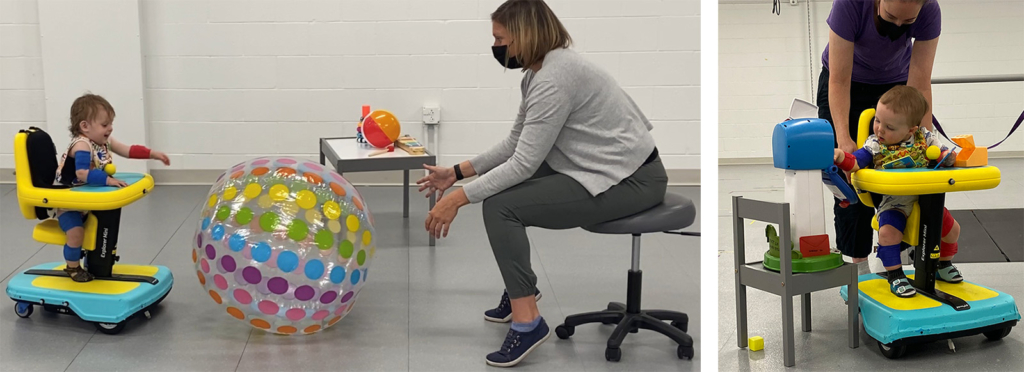In 2021, CREATE was thrilled to launch our collaboration with UW I-LABS (Institute for Learning & Brain Sciences). The goal of this project is to merge CREATE’s expertise in accessible technology with I-LABS’ expertise on early development and brain imaging to support early mobility and participation for children with disabilities.
This joint work will demonstrate that early access to mobility technology is a critical asset for development and learning and also contributes to CREATE’s goal of understanding and addressing historical perceptions of disability and assistive technology, which often serve to perpetuate exclusion despite legislation protecting individuals’ rights to mobility and technology.
While extensive prior research has investigated how children learn to crawl and walk, we lack fundamental knowledge of how children who use alternative modes of mobility learn to explore and navigate their environments — and how accessible technology can support their play and exploration.
Early Access
866 toys adapted; 100 families, schools or clinics received toys
100+ cars delivered in Washington and the U.S. through Go Baby GO
The CREATE + I-LABS team has obtained IRB approval and launched our clinical trial examining early learning, development, and the neuromechanics of self-initiated movement with the Explorer Mini. CREATE postdoctoral fellow Kim Ingraham is leading these experiments, including in-lab quantitative assessments of movement, muscle activity, language, and navigation.

This past fall, with an Explorer Mini in tow, the team traveled to Denver to partner with LUCI, a company that makes semi-autonomous wheelchair technology that aids drivers in avoiding obstacles and tipping and drop-off hazards, and provides the user with device performance feedback. Together, LUCI and our team have developed a custom-sensor suite for the Explorer Mini to track joystick motion, bodyweight support, and navigation. Ingraham also developed a virtual reality game platform to quantify and understand joystick interaction and learning for young children with disabilities.
Two mechanical engineering Ph.D. students, Nicole Zaino and Mia Hoffman, both supported by National Science Foundation Graduate Research Fellowships, have also joined the team. Zaino is examining the neuromechanics of seated and standing postures on motor learning with the Explorer Mini. Hoffman is extending these methods to community deployments with the Explorer Mini and affordable GoBabyGo Ride-On Cars, including integrating measures of community environments from Project Sidewalk (led by CREATE Associate Director Jon Froehlich) to understand the impact of environmental barriers and community accessibility on family use patterns with early powered mobility technology.
We have also hired an experienced pediatric assessment partner, Anna Fragomeni, PT, PCS, who will lead the pre- and post-intervention developmental assessments to determine how powered mobility learning may influence developmental domains such as gross and fine motor skills, cognition, communication, socio emotional engagement, and adaptive behaviors.
RECENT NEWS
Articles on early access and mobility research at CREATE.
Wheels in motion: Improving mobility technologies for children
February 28, 2024 Being able to easily get from the house to the playground affects how long and how often children use an adapted ride-on car, according to a study, Off to the park: a geospatial investigation of adapted ride-on car usage, published by CREATE Ph.D. student Mia Hoffman with CREATE associate director Heather A.…
Winter 2023 CREATE Research Showcase
At the December 2023 CREATE Research Showcase, students from CSE 493 and other CREATE researchers shared their work with faculty, students, and community partners.
Off to the Park: A Geospatial Investigation of Adapted Ride-on Car Usage
November 7, 2023 Adapted ride-on cars (ROC) are an affordable, power mobility training tool for young children with disabilities. But weather and adequate drive space create barriers to families' adoption of their ROC. CREATE Ph.D. student Mia E. Hoffman is the lead author on a paper that investigates the relationship between the built environment and…
Accessible Technology Research Showcase - Spring 2023
The 2023 CREATE and HuskyADAPT research showcase brought 25 project presentations and over 100 attendees.